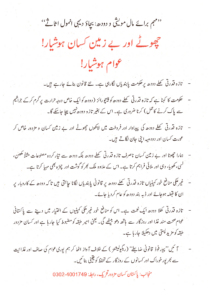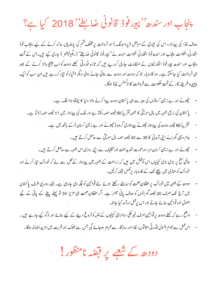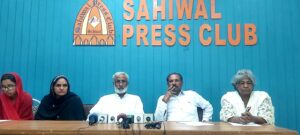On International Labor Day, PKMT, Roots and Sanjhi Dharti participated in a live TV program Public Forum and highlight the imperialist attack on agriculture workers, and landless farmers in the milk & livestock sector. #SaveOurInvaluableRuralAssets
Category Archives: Agroecology
Kheti Sar Seti with Kamal Lashari #SaveOurInvaluableRuralAssets
Watch full episode of Kheti Sar Seti with Kamal Lashari, a TV program on Sindh TV News for Save Our Invaluable Rural Assets. The corporate sector’s attack on the agriculture and livestock sector in Pakistan is vicious. The imperialist agenda will be defeated.
مہم برائے مال مویشی دودھ : بچاؤ دیہی انمول اثاثے – پمفلٹ
بچاؤ دیہی انمول اثاثے؛ مہم برائے مال مویشی و دودھ
پریس ریلیز| 8 مارچ 2023
پاکستان کسان مزدور تحریک نے مزدور عورتوں کے عالمی دن 8 مارچ، 2023 کو ”بچاؤ دیہی انمول اثاثے؛ مہم برائے مال مویشی و دودھ“ کا آغاز کیا ہے۔ اس مہم کا مقصد حکومت کے تازہ قدرتی کھلے دودھ پر مکمل پابندی کے قانون، دودھ اور مال مویشی کے شعبے میں بڑھتی ہوئی آزاد تجارتی پالیسیوں اور اس شعبہ پر ملکی اور غیر ملکی کمپنیوں کے قبضے کے خلاف کسان و عوام کو خبردار کرتے ہوئے اپنے خوراک و روزگار اور ماحول کے بچاؤ کے لیے عوام کو متحرک کرنا ہے۔
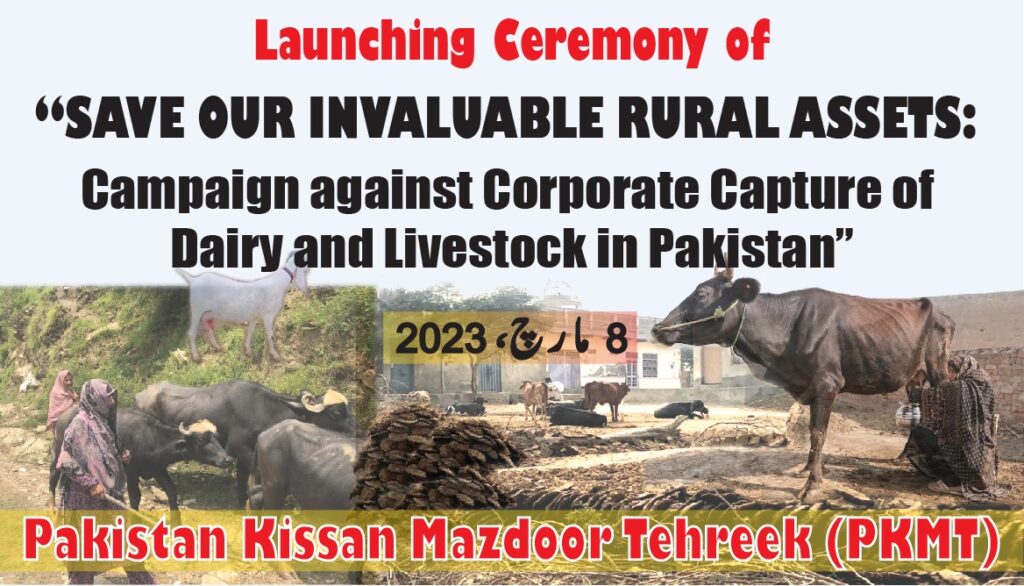
پنجاب اور سندھ فوڈ اتھارٹیوں نے دودھ کے شعبہ میں بڑھ چڑھ کر قانون سازی شروع کی ہے۔ اس حوالے سے پنجاب اور سندھ فوڈ اتھارٹی نے 2018 میں پیور فوڈ قانونی ضابطے (ریگیولیشنز) جاری کیے ہیں۔جس کے فوری اطلاق کے لیے اب پنجاب حکومت لاہور اور اس کے بعد پورے پنجاب میں تازہ قدرتی کھلے دودھ پر مکمل پابندی کے لیے بار بار اعلانات کررہی ہے۔ ان قانونی ضابطوں کے تحت تازہ قدرتی کھلے دودھ کو پیسچورائز کرنے کے بعد ہی فروخت کیا جاسکتا ہے۔ وہ کاروبار جو کہ دودھ اور دودھ سے بنائی جانے والی دیگر اشیاء کو تیار کررہے ہیں ان سب کو حکومت سے فروخت کا لائسنس لینا ہوگا۔
اس قانون کے پیچھے کونسے طاقت ور گروہوں کا ہاتھ ہے؟ یہ قوانین عالمی تجارتی ادارہ ڈبلیو ٹی او کے تحت سینیٹری اور فائیٹو سینیٹری معاہدہ اور ٹیکنیکل بیریئرز ٹو ٹریڈ کو مد نظر رکھ کر بنائے گئے ہیں۔ ان قوانین کو دراصل بڑی بڑی دیو ہیکل دودھ اور مال مویشی کے سرمایہ دار اور سرمایہ کار کمپنیوں کی ایما پر کیا جارہا ہے۔ بین الاقوامی سطح پر دودھ اور دودھ سے تیار کردہ مکھن، پنیر، ملائی اور دیگر مصنوعات یہی اجارہ دار کمپنیاں تیار اور فروخت کرتی ہیں اور بے تحاشہ منافع کماتی ہیں۔ ان کے بالمقابل چھوٹے اور بے زمین کسان گھرانے ہیں جن میں خاص کر اس شعبے سے منسلک مزدور کسان عورت کی سخت محنت ہمارے پورے ملک کو دودھ اور گوشت جیسی انمول غذا فراہم کرتے ہیں۔ دراصل اجارہ دار کمپنیاں ان ہی لاکھوں گھرانوں کی روزی اور خوراک پر ڈاکہ ڈال رہی ہیں۔ دیہی کسان مزدور عورت کا زراعت بالخصوص مال مویشی اور دودھ کی پیداوار میں کلیدی کردار کی وجہ سے ہی اس مہم کا آغاز مزدور عورتوں کے عالمی دن 8 مارچ سے کیا جارہا ہے۔ Continue reading
بھوک کا عالمی دن 2022: خوراک کی خود مختاری اور موسمیاتی انصاف کی جدوجہد
پریس ریلیز 16 اکتوبر 2022
زراعت اور خوراک کا عالمی ادارہ فاؤ دنیا کی اشرافیہ کے ساتھ ملکر آج خوراک کا عالمی دن منا رہی ہے جبکہ چھوٹے اور بے زمین کسانوں، شہری اور دیہی مزدوروں اور عوام کے لیے یہ بھوک کا عالمی دن ہے۔ پوری دنیا میں بھوک اور قحط کی موجودہ صورتحال عالمگیریت کے بھیانک چہرے کی عکاسی کرتا ہے۔
عالمی سطح پر بھوک کے اعداد و شمار ایک بار پھر بلند ترین سطح پر پہنچ گئے ہیں۔ 2021 میں، دنیا بھر میں تقریباً 2 ارب 30 کروڑ افراد غذائی کمی اور غذائی عدم تحفظ کا شکار ہیں اور تقریباً 83 کروڑ افراد بھوک کا شکار ہیں۔ رپورٹ کے مطابق جولائی 2022 میں 82 ممالک شدید غذائی عدم تحفظ کا شکار ہیں جس سے 34 کروڑ 50 لاکھ افراد متاثر ہو رہے ہیں۔
اس بھوک کو مزید ہوا سامراج کا پیدا کردہ موسمی بحران دے رہا ہے۔ صرف پاکستان میں حالیہ مون سون کی شدید بارشوں کے نتیجے میں 80 لاکھ ایکڑ سے زائد کھڑی فصلیں تباہ ہو چکی ہیں۔ لاکھوں کی تعداد میں مال مویشی، بڑی تعداد میں گندم کا ذخیرہ اور جانوروں کا ذخیرہ شدہ چارہ 8 ہفتوں کے دوران ہونے والی مسلسل بارشوں اور سیلاب کی وجہ سے ضائع ہو گیا ہے۔ واضح رہے کہ پاکستان موسمیاتی تبدیلیوں سے سب سے زیادہ متاثر ہونے والے دس ممالک میں شامل ہے۔ اقوام متحدہ ادارہ برائے انسانی فلاح نے عندیہ دیا ہے کہ تقریباً 57 لاکھ سیلاب زدگان کو اگلے تین ماہ میں خوراک کے سنگین بحران کا سامنا کرنا پڑے گا۔ عالمی ادارہ برائے صحت (ڈبلیو ایچ او) کے مطابق حالیہ سیلاب سے پہلے بھی 16 فیصد آبادی کم یا شدید غذائی کمی اور عدم تحفظ کا شکار تھی۔ Continue reading
Govt asked to protect rights of small, landless farmers
PESHAWAR: Representatives of farmers, agriculture workers and non-governmental organisations said here on Tuesday that the government was allowing free market forces to take over land, livestock, food production and processes as well as markets instead of promoting small and landless farmers.
They vowed to fight all forms of feudal encroachments and grabbing of agricultural land by big corporations and to strive for food security.
Addressing a press conference at Peshawar Press Club, representatives of Pakistan Kisan Mazdoor Tehreek (PKMT) and peasant movements demanded of the federal government to provide substantial economic relief through social protection initiatives to all the marginalised people, especially women.
The presser was organised in connection with the Day of the Landless. It was addressed by representatives from across the country, including PKMT general secretary Tariq Mehmood, Dr Azra Saeed of Roots for Equity, Zahoor Joya from Multan, Ali Nawaz from Ghotki, Nabi Jan from Peshawar and others.
“Even during the Covid-19 pandemic, instead of promoting and implementing policies that would promote sustainable food system, the United Nations supported mega business platforms and corporations to promote industrial-chemical methods of agricultural production,” he said.
Mr Mehmood said that corporate farming systems, including those being used in the dairy and livestock sector, were responsible for eviction of small and landless farmers from their communities. A key example, he claimed, was the authority’s taking away control of the fresh milk sector from small producers and giving it to huge corporations.
He said that digitalisation of the food production system would allow further encroachment of not only agro-chemical corporations, but also financial and IT corporations to control agriculture.
Published in Dawn, March 30th, 2022
https://www.dawn.com/news/1682440/govt-asked-to-protect-rights-of-small-landless-farmers
Corporate Capture in Dairy and Livestock
Press Release | Women Farmers’ Press Conference on Corporate Capture in Dairy and Livestock
On November 10 2021, women farmers and members of Pakistan Kissan Mazdoor Tehreek (PKMT) held a press conference at the Sahiwal Press Club to protest against governments crackdown on fresh milk, the proposed ban on the sale of fresh milk along with the impending implementation of the Minimum Pasteurization Law as well as increasing trade liberalization and corporatization of the dairy and livestock sector.
Women farmers said that dairy corporations seeking to capture the dairy sector for their own profits are leading the attack against fresh milk by labelling it unsafe and unhygienic. Majority of the people in our country prefer the taste of fresh, whole milk and it is due to corporations’ failure to increase the popularity of packaged milk that they are resorting to other means, including pushing for stringent processing regulations and enlisting doctors and scientists to back unfounded claims regarding the safety of farmer-produced milk. According to PKMT members, international standards dictated by Codex and WTO form the base of attacks against fresh milk, corporate maligning of fresh milk makes no logical sense since our ancestors have been producing and consuming milk in the traditional way since many millennia without any negative impacts on their health.
Women farmers also spoke of the recent drive to import foreign cattle for increasing milk productivity. They said that such measures only benefit large cattle farms since small and landless farmers cannot afford to buy and sustain imported cattle due to high cost of industrial animal feed, veterinary costs and infrastructural costs. Additionally, there are high security risks of keeping expensive cattle in villages. The popularization of high-tech processes including artificial insemination techniques and genetic manipulation as well as company-produced products including hybrid fodder seeds and mechanized milking equipment are part of a drive to establish large-scale dairy farms and drive out small and landless farmers from the dairy and livestock sector.
Asserting their position as the key workforce in livestock rearing and maintenance, women farmers also highlighted how land and livestock are complex and deeply interconnected components of rural economies and are crucial to their livelihoods. Women reiterated the demand for just and equitable land distribution, saying that land access is crucial for accessing fodder to sustain livestock. They also said that the sale of milk, milk products and dung cakes ensures regular income that is critical for daily household expenditure. A ban on fresh milk and corporate takeover of the sector would not only steal their livelihoods but would also be detrimental to their health; access to fresh milk works to offset rural nutritional deficit due to consumption of milk, butter, yoghurt, lassi and ghee.
Women said that the imposition of anti-farmer and pro-corporate standards and policies is threatening their lives, livelihoods and their right to food sovereignty. They made the following demands:
- Prioritize just, equitable and genuine land reforms that allow land redistribution to landless farmers, including women agriculture workers
- Ensuring women’s right to own and control land, livestock and all productive resources
- Reject WTO-enforced international food safety standards and all WTO Agreements, including TRIPs Agreement that has captured farmers’ seed resources and now, is attacking livestock genetic resources
- Conserve hardy indigenous livestock species that are resilient, well-adapted to local climate and produce high-quality milk (using local varieties of fodder)
- Government must disallow foreign investments in farming, dairy and livestock sector that are encouraging the formation of large-scale, mechanized corporate entities
Release by: Pakistan Kissan Mazdoor Tehreek & Roots for Equity
Urdu Press Release; Press Release_Press Conference_Sahiwal
Corporate entities, IFIs and neoliberal policies are directly responsible for the hunger, malnourishment and economic destitution
Press Release | PKMT 14th Annual Conference 2021 | October 15-16, 2021
Pakistan Kissan Mazdoor Tehreek held its 14th Annual Conference from October 15 -16 at Renewal Centre, Lahore and simultaneously, held panel discussions and demonstrations to mark International Rural Women’s Day and World Hunger Day. During the events, speakers held corporate entities, IFIs and neoliberal policies accountable for creating food systems that are directly responsible for the hunger, malnourishment and economic destitution of more than a billion.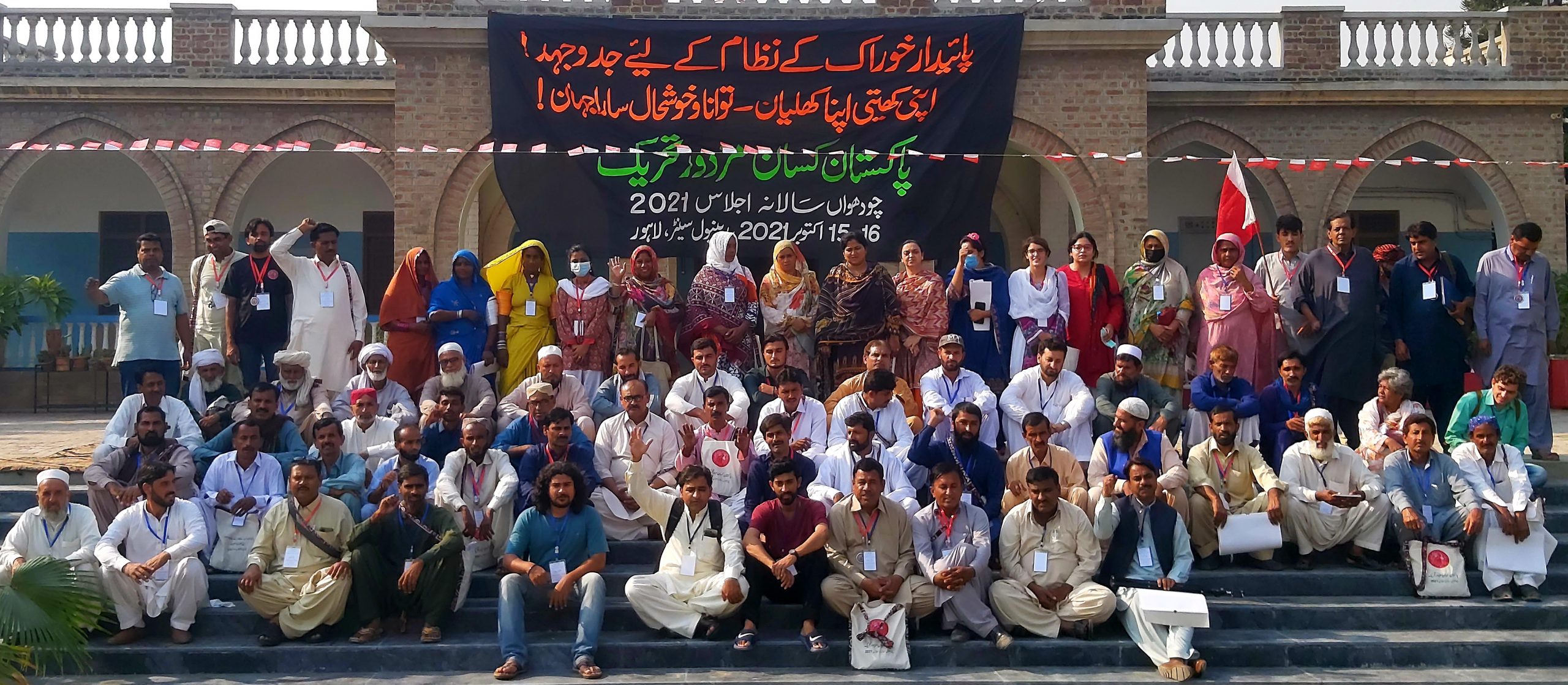
Azra Sayeed, Roots for Equity exposed corporate hijack of the United Nations Food Systems Summit, highlighting the role of the World Economic Forum, and foundations especially, the Gates Foundation and philanthropies who have provided corporate-driven policies depriving farmers of land, livelihood and food by funding technology intense systems in third world countries; the entire UNFSS was termed as nothing but a hallmark of false solutions to hunger e.g. pre-mixed therapeutic food that accrues billions of dollars in profit for corporations. Wali Haider, PKMT General Secretary highlighted the neoliberal policies in food and agriculture introduced in Pakistan amidst the pandemic reflecting much of the neocolonial policies emitting from the UNFSS. These policies are a fresh wave of attacks on small and landless farmers in Pakistan, embedded in the Pakistan Agricultural Transformation Plan, Kisan Card scheme, CPEC’s agricultural policies and livestock development programs. Policy features of digitalization of the agricultural economy, value chain strengthening and cluster-based food production panders to the corporate lobby, facilitates corporate land grab for export-oriented production, benefits landlords and industrialists and captures natural resources e.g. water, agricultural land, forests and rare minerals for company use. Essentially, it is a blueprint of UNFSS’s vision for food systems transformation and completely overrides small farmers’ rights to land and livelihood.
According to Raja Mujeeb, Steering Committee member, PKMT, the Global People’s Summit, a Global-South counter to the UNFSS main objective was to mobilize landless farmers, agricultural workers, indigenous peoples, fisherfolk and rural women across the world to develop a People’s Action Plan and draw up a Declaration for a people-led radical transformation of the current food regimes towards just, equitable, healthy, and sustainable food systems. The GPS is a testimony of the people’s collective resistance against the global corporate food empire and a call for genuine food systems transformation.
As part of the panel on movements and struggles, Asif Khan, PKMT Steering Committee member, presented an overview and analysis of peoples’ struggles and movements across the world, saying that revolutionary politics and direct action is the only way to grant farmers complete rights overall productive resources and complete autonomy and decision making in food and agriculture.
A number of other activities highlighted Rural Women’s Day with a tribute to rural women for the formal and informal, paid and unpaid work in food and agriculture. PKMT also celebrated 10 years of its struggle for seed sovereignty by holding a seed mela with indigenous seeds from all over Pakistan.
In addition, a protest was held as part of the Global Day of Action against IMF and World Bank Annual Meetings. The protest actions called for an immediate TRIPS waiver, debt cancellation and an end to resource plunder and greenwashing practices in the name of development.
Demands:
- Implementation of agroecological approaches to agriculture based on food sovereignty principles that center peasants’ right to land and collective rights over all critical productive resources, in order to create just, equitable, healthy and sustainable food systems that ensure safe and nutritious food for all;
- Recognition of the role that women and rural communities play in conserving plant and animal genetic resources through agricultural practices rooted in traditional knowledge;
- Boycott all neoliberal corporate-led platforms, policies and action plans such as UNFSS and bilateral and multilateral trade agreements such as the RCEP, CPTPP and others that allow the monopolization of global trade by TNCs;
- Provide climate justice now by demanding greater accountability and higher compensation for solutions from countries with a higher level of development who have destroyed Earth’s life systems due to extractive and polluting capitalist production model.
Release by: Pakistan Kissan Mazdoor Tehreek (PKMT)
Farmers Reject United Nations Food Systems Summit (UNFSS)
Press Release
22 September 2021
Roots for Equity and Pakistan Kissan Mazdoor Tehreek held the National Food Systems Summit at Renewal Center, Lahore on September 22, 2021. The National Summit was held as national mobilization towards the Global People’s Summit (GPS) for Just, Equitable, Healthy and Sustainable Food Systems. The GPS has been organized through the coordinated efforts of peoples’ movements and farmers’ movements, a unity of more than 21 organizations across the world, and is a Global-South led initiative to counter the United Nations Food Systems Summit (UNFSS) and its neoliberal corporate agenda being held on September 23, 2021.
We, the people, maintain that UNFSS has been overtaken by the private interests of the corporates and elites. Dr. Azra Talat Sayeed, Executive Director at Roots for Equity, shed light on how the UNFSS platform is using neoliberal policies to reinforce corporate control over food and agriculture through propagating false solutions (e.g. food fortification, genetic modification, industrial meat production systems, monocultural food production) to climate change, hunger and malnutrition. It is clear that corporate-driven approaches are marginalizing, criminalizing and co-opting indigenous knowledge as well as eroding biodiversity through industrializing agriculture. The National Food Systems Summit Pakistan aims to counter the corporate-controlled narrative of UNFSS by amplifying people’s demands for genuine food systems transformation.
Through the panel sessions on land and environmental rights, women’s rights and collective rights over natural, genetic and productive resources, the National Summit highlighted the injustices that prevail in our current corporate-controlled, feudal-controlled food systems. In particular, Asif Khan and Chowdhry Aslam talked about issues of landlessness and corporate capture of genetic and productive resources. Roop Kanwal, a member of PKMT Youth Wing said that a critical issue remains the total control of land by a handful of feudal families in the country and absolute negation of women farmers’ rights, an overwhelming majority of whom are landless. Shaheen Maher said that women agriculture workers receive pittance for their backbreaking labour, especially working on export-driven crops such as cotton and sugarcane. Malik Aman, PKMT member from Manshera posited that environmental degradation by corporate-led systems are a discord to environmental justice.
Furthermore, the National Summit engaged farmers, including women, youth and landless farmers, trade union, academics, civil society and activists from various sectors in a series of workshops. As a contribution to the collective global response of peoples’ movements, participating farmers and activists formulated concrete demands and developed initial action plans for achieving food sovereignty through genuine agrarian reform, sustainable system change and a radical transformation of the world’s food systems.
Tahir Mehdi from Punjab Lok Sujag, Fozia Parveen from LUMS, Neelam Hussain from Simorgh Publications and Tahira Abdullah, a human rights defender, also raised key issues during their interventions in the panel sessions.
Demands:
Genuine agrarian reform and implementation of just, equitable and self-reliant sustainable food production and consumption systems that are based on small and landless farmers, including women farmers, ownership and control over land and other critical productive resources, access to safe and decent livelihood, and sustainable food production and consumption systems;
Women’s control over land and livestock as a key resource for protecting and promoting a healthy balanced life for women, their children and communities;
Recognition of the role that women and rural communities play in conserving plant and animal genetic resources, ensuring the continuity of biodiverse ecosystems and perpetuating agricultural practices rooted in traditional knowledge;
Promoting environmentally safe technologies that are controlled and owned by communities as the ultimate guardians of our environmental resources;
Prevent farmers’ evictions from indigenous land and ensure that no development work acts as a cover for further land grabbing or resource grabbing by corporations;
Ensuring that all farmers and indigenous populations retain their customary rights over commons/public lands, forests, water resources and other ecologies which is crucial sources of their life and livelihood;
An end to the stronghold of monopolistic agrochemical transnational corporations over global food production and distribution systems;
An end to trade liberalization through dismantling of institutions and mechanisms such as the WTO, and other inequitable bilateral and multilateral trade agreements such as the RCEP, CPTPP among other that allow the monopolization of global trade by TNCs;
Accountability of Transnational agribusinesses for the industrial fossil-fuel based industrial production to the imminent climate emergency vis-à-vis unchecked high levels of greenhouse gas emissions;
Immediate, state-led action towards outlawing toxic chemical pesticides and fertilizers and reinstating sustainable agroecological/indigenous farming and livestock practices based on food sovereignty principles;
Ensure a robust public healthcare system that makes quality healthcare accessible to rural populations, including free testing services for Covid-19 as well as immediate provision of free and accessible vaccination;
Establish markets, led by small farmers, particularly women farmers;
Mobilize farmers and other sectors to form unions and associations that build and strengthen the movement against capitalist corporate hegemony of capitalist countries in food and agriculture.
Release by: Pakistan Kissan Mazdoor Tehreek & Roots for Equity
“Building a Healthy Planet: Promoting Safe and Nutritious Food for All.”
Press Release; July 1, 2021
On July 1, 2021, Pakistan Kissan Mazdoor Tehreek (PKMT) and Roots for Equity held a webinar to launch their joint campaign titled “Building a Healthy Planet: Promoting Safe and Nutritious Food for All.”
Mr. Tariq Mehmood provided an overview of the campaign with its objective of sensitizing small producers, consumers and society in general regarding the human and environmental cost of corporate-controlled and chemical-intensive industrial agricultural production and promoting the use of agroecology and food sovereignty as an antidote to corporate agriculture.
Dr. Azra Talat Sayeed from Roots for Equity highlighted the need for an alliance of progressive voices and platforms in urban and rural areas that can struggle for access to safe and nutritious food for all, especially in the face of a global crisis the Covid-19 pandemic. She highlighted the urgent need for solidarity amongst small producers, industrial workers, consumers, academics, women, youth and other actors in the struggle for food sovereignty. According to her, that was the most needful act as a way forward in the face of multiple social, economic and political factors that are impacting food production and consumption. She highlighted the numerous crises including food and economic crisis, environmental, health and climate among others. Dr Sayeed identified the role of corporate agriculture along with other imperialist institutions such as the World Trade Organization (WTO) and other institutions that should be held accountable for the destruction of the environment and sharply rising global inequities, including rising hunger.
Shaheen Mahar, a PKMT member from Ghotki, highlighted women farmers’ immense, unparalleled labour and demanded immediate redressal for the injustices they face, especially their lack of access to food, let alone safe and nutritious food. In the face of Covid-19, women are facing acute hunger as well as lack of decent livelihood. She stressed the need for not only women’s right to land but implementation of land ownership for women farmers. She pointed out that the ongoing trade liberalization and corporatization of the dairy sector along with government-led crackdowns on the sale of raw milk are a direct threat to rural women’s livelihoods and their right to food sovereignty. Shaheen also elaborated on the gendered impact of chemical pesticide usage; since women agriculture workers are extensively involved in pesticide application, they face numerous health risks due to direct exposure to toxic pesticides.
Asif Khan, a farmer from Haripur and PKMT Steering Committee member stressed the need for self-reliance in food and agriculture production. He emphasized that unchecked industrial development, capitalist first-world countries and fossil-fuel driven corporate agriculture are responsible for environmental destruction, climate crisis and are a source of a high percentage of past and present emissions. Yet, it is small and landless farmers in third world countries, along with other marginalized groups, who disproportionately bear the brunt of climate change. Asif critiqued the inequitable nature of the world food system; despite having tenuous access and ownership rights to land and other productive resources, small farmers toil ceaselessly to produce most of the world’s food. He stressed the need for an alternate just and equitable food system as the basis for healthy, nutritious food production.
Mr. Zahoor Joya presented an outline of the scheduled activities for the campaign starting from today and continuing until October 16, 2021, culminating in programs to mark 15th and 16th October as the International Day for Rural Women, and World Food Day which PKMT and Roots for Equity mark as World Hunger Day.
Demands:
- An end to poisonous agricultural inputs and an end to monopolistic control of TNCs in the food and agriculture sector;
- Provision of food and agriculture laws that promote agroecological food production as a safe, viable & sustainable alternative to corporate agriculture;
- Mobilization of peasant movements to fight for their right to self-reliance and self-determination in food production & distribution;
- Promotion of healthy and nutritious cultural foods like local fruits and vegetables, milk, desi ghee, butter and lassi as opposed to mass-produced, processed foods devoid of nutrition
- Repeal of detrimental neoliberal food and agriculture policies that impede farmers’ right to decent livelihood
- Prioritize just, equitable and genuine land reforms that allow land redistribution to landless farmers (including women agriculture workers) along with control over all productive resources;
- Farmers’ access to and control over reliable markets for agricultural and non-agricultural products
- Small and landless farmers’ access to government credit schemes, government subsidies and social security benefits.
Release by: Pakistan Kissan Mazdoor Tehreek (PKMT) & Roots for Equity

